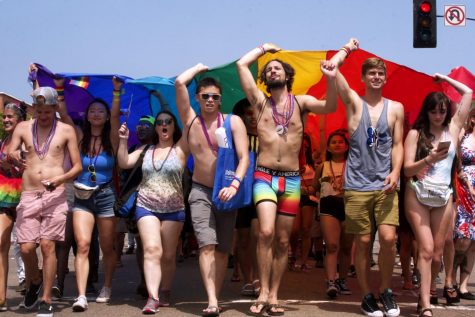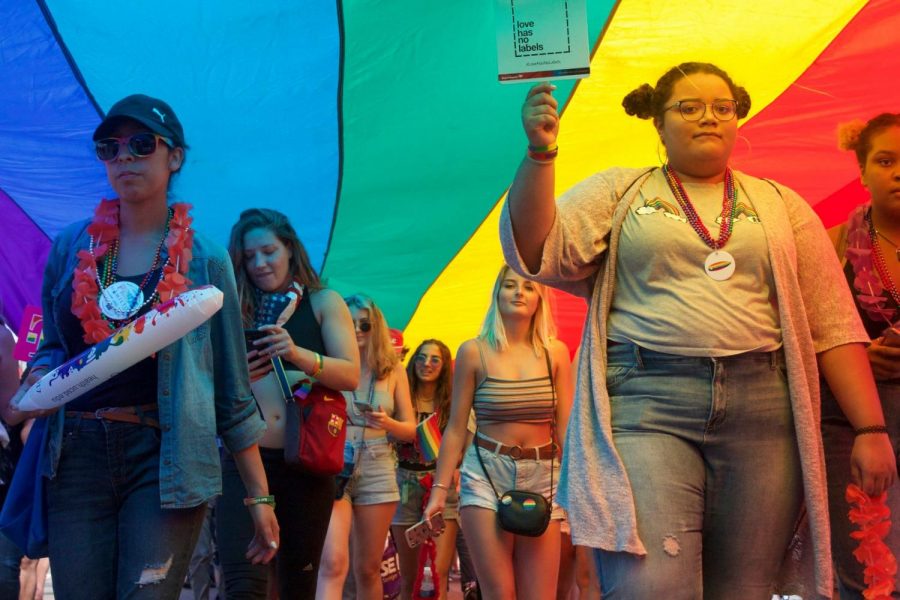Hey Mom, I’m queer!
National Coming Out Day is Oct. 11
Under the rainbow at the Pride Parade in Hillcrest on July 14, 2017.
October 5, 2017
National Coming Out Day is next Wednesday, a day that Lesbian, Gay, Bisexual, Transgender, and Queer (LGBTQ) people can come forward and declare to whoever they want, “Hey, I’m ___ and I’m proud!”
The tradition began on Oct. 11, 1987 when half a million people participated in the March on Washington for Lesbian and Gay Rights. The ripples of influence of that march led to the creation of multiple LGBTQ organizations and the designation of a National Coming Out Day.
Differing sexualities and gender expressions are more common than we were led to believe.
According to the Human Rights Campaign, a national civil rights organization, one out of every two Americans has someone close to them who is gay or lesbian. For transgender people, that number is one in 10.
As much as I dislike these “everyone gets a like on social media” national days, I think this particular tradition is important for the LGBTQ community. For someone who is closeted to everyone or to certain people, this day gives an opportunity to state who we are.
Many of us are afraid to come out, for fear of our mental and physical safety. Some of us feel that we can never come out to our parents, or even to our best friends, because they’ll judge us or hurt us. Some of us have been hurt by the very people we trusted to confide in.
As a queer woman, I have the pleasure of coming out to new people on a regular basis. After further exploring my sexuality, I discovered I’m pansexual. That means I am comfortable dating any person that loves, respects and appreciates me.

No stopping or turning around at this year’s Pride Parade in Hillcrest, July 14, 2017.
Coming out is especially fun since some of the people I meet either haven’t heard of pansexuality or don’t believe it exists. My usual line is, “I don’t care what you’ve got, just make me laugh and tell me I’m the only one.”
In my family, my sexuality was never a major issue. When I came out to my mother, she said, “Oh honey, we knew when you cut your hair!” My fathers are supportive and joke about it almost as much as I do.
This isn’t the case for LGBTQ people around the United States and the world. According to the Human Rights Campaign 21 transgender people have been violently killed in the U.S. in 2017 alone.
Just last Thursday three people were charged with murder after a transgender teenager named Ally Steinfeld was stabbed, burned, and had her eyes gouged out in Cabool, Mo. The officers who searched the home Steinfeld’s body was found in said the remains were in a pile and a plastic bag, according to the Bradenton Herald. The sheriff of Cabool, James Sigman, is not calling the murder a hate crime.
San Diego mourned when three transgender teenagers committed suicide in 2015. According to a study in the same year by the Center for Disease Control, nearly one third of LGBTQ youth had attempted suicide within the last year.
This is why Coming Out Day is popular and important to the LGBTQ community. “If more of the population that identifies as LGBTQ steps forward, the closer we move towards acceptance,” said David Fuentes, who works with Art Safe Place, a program connected to the Youth Services for the San Diego LGBTQ Community Center in Hillcrest.
“I would like to see a future generation where LGBTQ people don’t have to come out because the act itself does marginalize you,” they said. “It’s freeing and it’s liberating but it does put you apart from the norm since heterosexuals don’t need to come out.”










